India Budget 2024: Focus on Jobs, Inflation Praised
By Rediff Money Desk, New Delhi Jul 23, 2024 17:55
Economists applaud India's 2024 Budget, highlighting its emphasis on job creation, inflation control, and fiscal prudence. They praise the government's responsiveness to economic concerns.

Dominic Xavier/Rediff.com
New Delhi, Jul 23 (PTI) The focus of Finance Minister Nirmala Sitharaman's Budget on employment generation, inflation management, and fiscal prudence augur well for the economy, eminent economists said on Tuesday.
Commenting on the the Budget 2024-25, former NITI Aayog vice-chairman Rajiv Kumar said it was good to see that the government has given the first priority to employment and skill development.
"Shows the government has its ears close to ground and is not being led by spurious claims on massive job generation as done by some economists," Kumar said.
He also welcomed the finance minister's proposal to reduce customs duty on gold imports to 6 per cent, saying this will reduce smuggling and lower prices.
Commenting on the finance minister's proposal to raise the long-term capital gains tax to 12.5 per cent from 10 per cent, Kumar said it is not clear if this rate will apply uniformly for both financial and non-financial assets.
"This will perhaps dampen the flow of household saving to financial instruments," he said.
Commenting on the Budget, NIPFP distinguished professor Pinaki Chakraborty told PTI that a stable path of fiscal prudence needs to continue to reduce the Union government's debt and deficit to a level consistent with the Fiscal Responsibility and Budget Management Act.
"A comprehensive review of the Income Tax Act 1961 has been announced in the Budget.
"Since modern-day tax system is driven by simplicity and an easy to administer tax system, this review of the Income Tax Act is a significant announcement," Chakraborty said.
According to him, upfront reference of rising global economic uncertainty and rising risk of global inflation by the finance minister highlighted the challenges an emerging economy like India is confronting due to rising global macroeconomic uncertainties.
Finally, Chakraborty noted that many reform measures proposed in this year's Budget are in the functional domain of states.
"The success of such reforms would depend on the Union-State coordination and the willingness of the state governments to undertake such reforms without compromising state-level fiscal autonomy," he said.
NIPFP Professor N R Bhanumurthy told PTI that Union Budget 2024-25 is broadly a continuation of the interim Budget with some improved fiscal space as well as shift towards jobs.
Pointing out that at the macro level, compared to interim Budget, the fiscal numbers are an improvement, Bhanumurthy said, "The Budget continues to focus on enhancing capital expenditure, retains the interim Budget allocations, although with higher RBI dividend, one would have expected larger allocation for states within their capital expenditure allocation.
In some sense, he said despite larger external headwinds and also with less support from the private sector, the Centre continues to ensure the recovery process.
Institute for Studies in Industrial Development (ISID) Director Nagesh Kumar told PTI that the Budget statement of the Finance Minister covers a vast ground.
"The key themes that stand out include the focus on job-creation, boost to the manufacturing sector, enhancing sustainability and dynamism of the economy, including through innovation and infrastructure development," Kumar said.
According to him, while job creation has been an often talked-about priority in the budgets presented by different governments, the Budget 2024-25 is a trendsetter in terms of proposing credible schemes of employment-linked incentives (ELIs) that are likely to not only incentivise the private sector to create more jobs but also hopefully reverse the growing trend of contractualisation of the employment in the private sector.
He said renewed focus on skilling, including the new scheme of subsidised internships in the corporate sector and provision of subsidised loans to students for education, among other proposals, will help to enhance the employability of youth.
Kumar pointed out that the continued emphasis on infrastructure capex will drive the economy directly and help crowd-in private investment, working as a multiplier, especially by augmenting demand for key manufacturing sectors such as steel, cement, and capital goods industries, among others, with a cascading effect on other sectors.
Commenting on the the Budget 2024-25, former NITI Aayog vice-chairman Rajiv Kumar said it was good to see that the government has given the first priority to employment and skill development.
"Shows the government has its ears close to ground and is not being led by spurious claims on massive job generation as done by some economists," Kumar said.
He also welcomed the finance minister's proposal to reduce customs duty on gold imports to 6 per cent, saying this will reduce smuggling and lower prices.
Commenting on the finance minister's proposal to raise the long-term capital gains tax to 12.5 per cent from 10 per cent, Kumar said it is not clear if this rate will apply uniformly for both financial and non-financial assets.
"This will perhaps dampen the flow of household saving to financial instruments," he said.
Commenting on the Budget, NIPFP distinguished professor Pinaki Chakraborty told PTI that a stable path of fiscal prudence needs to continue to reduce the Union government's debt and deficit to a level consistent with the Fiscal Responsibility and Budget Management Act.
"A comprehensive review of the Income Tax Act 1961 has been announced in the Budget.
"Since modern-day tax system is driven by simplicity and an easy to administer tax system, this review of the Income Tax Act is a significant announcement," Chakraborty said.
According to him, upfront reference of rising global economic uncertainty and rising risk of global inflation by the finance minister highlighted the challenges an emerging economy like India is confronting due to rising global macroeconomic uncertainties.
Finally, Chakraborty noted that many reform measures proposed in this year's Budget are in the functional domain of states.
"The success of such reforms would depend on the Union-State coordination and the willingness of the state governments to undertake such reforms without compromising state-level fiscal autonomy," he said.
NIPFP Professor N R Bhanumurthy told PTI that Union Budget 2024-25 is broadly a continuation of the interim Budget with some improved fiscal space as well as shift towards jobs.
Pointing out that at the macro level, compared to interim Budget, the fiscal numbers are an improvement, Bhanumurthy said, "The Budget continues to focus on enhancing capital expenditure, retains the interim Budget allocations, although with higher RBI dividend, one would have expected larger allocation for states within their capital expenditure allocation.
In some sense, he said despite larger external headwinds and also with less support from the private sector, the Centre continues to ensure the recovery process.
Institute for Studies in Industrial Development (ISID) Director Nagesh Kumar told PTI that the Budget statement of the Finance Minister covers a vast ground.
"The key themes that stand out include the focus on job-creation, boost to the manufacturing sector, enhancing sustainability and dynamism of the economy, including through innovation and infrastructure development," Kumar said.
According to him, while job creation has been an often talked-about priority in the budgets presented by different governments, the Budget 2024-25 is a trendsetter in terms of proposing credible schemes of employment-linked incentives (ELIs) that are likely to not only incentivise the private sector to create more jobs but also hopefully reverse the growing trend of contractualisation of the employment in the private sector.
He said renewed focus on skilling, including the new scheme of subsidised internships in the corporate sector and provision of subsidised loans to students for education, among other proposals, will help to enhance the employability of youth.
Kumar pointed out that the continued emphasis on infrastructure capex will drive the economy directly and help crowd-in private investment, working as a multiplier, especially by augmenting demand for key manufacturing sectors such as steel, cement, and capital goods industries, among others, with a cascading effect on other sectors.
Source: PTI
Read More On:
DISCLAIMER - This article is from a syndicated feed. The original source is responsible for accuracy, views & content ownership. Views expressed may not reflect those of rediff.com India Limited.
You May Like To Read
TODAY'S MOST TRADED COMPANIES
- Company Name
- Price
- Volume
- GTL Infrastructure
- 2.89 (+ 4.71)
- 290655792
- Vodafone Idea L
- 15.28 ( -3.84)
- 94566069
- Khoobsurat
- 1.63 (+ 4.49)
- 31111790
- YES Bank Ltd.
- 24.96 ( -2.77)
- 29944484
- NCL Research
- 0.95 (+ 4.40)
- 26316293
MORE NEWS

ICICI Pru Life Q1 PAT Up 9% to Rs 224.34 cr |...
ICICI Prudential Life Insurance reported a 9% rise in profit after tax (PAT) for the...

FY25 Budget: Fitch Ratings on India's Fiscal...
Fitch Ratings commends India's FY25 Budget, highlighting its commitment to fiscal...
Budget Boosts Consumer Electronics: Growth &...
India's budget focuses on enhancing competitiveness in the consumer electronics sector,...



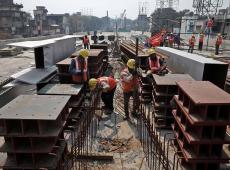
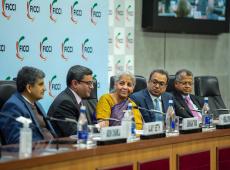
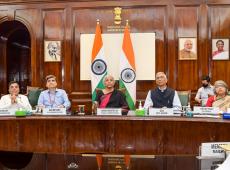
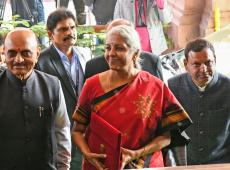
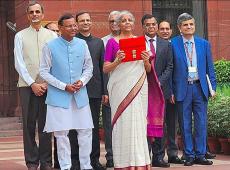


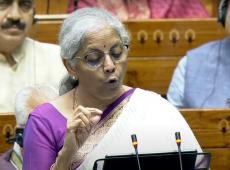

 © 2024 Rediff.com India Limited. All rights reserved.
© 2024 Rediff.com India Limited. All rights reserved.